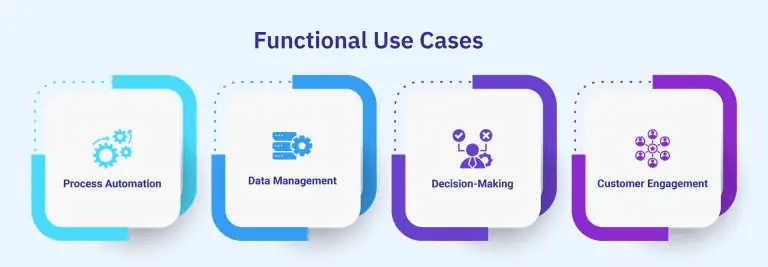Market Overview
Intelligent automation (IA) is a worldwide phenomenon driven by digital transformation. Not only every industry but every business is adapting to artificial intelligence and robotic process automation powered by intelligence automation. Market research suggests that IA may grow up to USD 31 billion by 2025 at a considerable compound annual growth rate (CAGR) of 12.3%.
This massive growth of intelligent automation services can be attributed to the provision of automation consulting services across sectors. Businesses all over the world are confronting pressing challenges, and AI can be a spectacular solution that can reduce costs and improve business efficiency.
Understanding Intelligent Automation and its Functionality
Intelligent automation augments AI and ML solutions along with RPA to create new intelligent process designs. It works on the basis of artificial intelligence algorithms to analyze all provided data, reach conclusions about what action to take next and perform specific tasks with the help of robotic process automation.
This synergy effectively helps organizations manage and integrate the automation of business activities to streamline decision-making processes and real-time process optimization through machine learning, which makes it possible for organizations to adopt digital transformation and optimize crucial business processes.
Key Benefits of Intelligent Automation:

Intelligent automation has been storming the business world with countless advantages. It improves productivity multifold, reduces human mistakes, improves customer experiences, and definitely reduces costs.
Top of all, IA enables businesses to derive valuable insights from various processes and tasks to improve sales and marketing strategies and overall decision-making for more innovation and a competitive edge.
Increased Efficiency:IA streamlines processes, reducing manual effort and increasing overall operational efficiency.
Cost Reduction:
Automating tasks reduces labor costs and minimizes errors, leading to significant cost savings.
Improved Accuracy:
AI-powered automation helps businesses remove human errors, delivering superior accuracy in processing data and making decisions.
Enhanced Customer Experience:
IA provides quicker answers to customer queries, resolves their grievances amicably, and interacts with relevance to ensure consumers’ benefit.
Scalability:
Automated solutions basically require investments that grow at a slower rate than demand, making it easier for firms to implement intelligent automation solutions with efficiency.
Data-Driven Insights:
IA is highly effective in processing huge volumes of information that can be instrumental in decision-making.
Compliance and Risk Management:
It makes sure that the permits are met with consistent standards as well as minimizes risks.
Employee Satisfaction:
Meaningful paperwork can be reduced as employing robotics within an organization can assume improved, uninteresting duties for the employees.
Intelligent Automation Use Cases in Diverse Industry

Manufacturing
Predictive Maintenance:IA applied to manufacturing equipment helps identify equipment likely to fail so that it can be attended to before causing a major upset in the manufacturing process.
Quality Control:AVI systems employ AI to identify flaws in products, thereby enhancing quality and minimizing waste.
Supply Chain Optimization:IA enhances inventory, demand, and logistics management in the supply chain, thus cutting costs where possible and making overall supply cost-efficient.
Finance
Fraud Detection:Thus, through the use of IT, specifically machine learning algorithms, transaction patterns can be analyzed in real-time to detect fraud and, in the process, increase financial security.
Customer Service:Multidisciplinary virtual assistants and live chat services help generate and proceed with constant queries and perform simple financial operations.
Risk Management:IA helps in credit score management and investment decision-making by analyzing the market trend and customer data for the evaluation of risks.
Healthcare
Patient Data Management:IA facilitates EHR to enable and present an accurate and current status of the patient’s health record for better management and performance of care delivery process coordination.
Drug Discovery:AI can help pharmaceutical companies discover drugs quickly by comparing structural formulas to identify promising drugs.
Clinical Trials:Smart solutions accelerate research by enhancing patient enrollment, data acquisition, and interpretation in clinical trials.
Retail
Customer Service:Chatbots can extend product advice and assistance, hence improving customer commerce experiences.
Inventory Management:IA uses sales data and sales trends to manage stock and minimize the occurrence of overstocking and stockout situations.
Supply Chain Optimization:Ordering and shipment of goods are automated, and demand for products is forecasted, which makes the retail chain efficient.
Functional Use Cases:
Process Automation:
IA eliminates enhanced and routine activities to pass on to departments, including data input, data analysis, and report production.
Data Management:
Automated systems feed on the data, process them, filter outliers, and come up with information you can use for decision-making.
Decision-Making:
Business intelligence involves the use of sophisticated systems, such as artificial intelligence algorithms, to sort out large raw data for crucial recommendations that will complement the organizational strategies regarding decision-making.
Customer Engagement:
IA helps create ‘one-to-one’ marketing communications, such as advertisements, chatbots, and recommendation systems.
How to Implement Intelligent Automation in Your Business:
Closely associate potential automation candidates with high volumes and clear procedural repetitiveness of work.
Organize the list of prospective automation cases according to potential ROI and impact on the company’s KPIs.
Select proper IA solutions, instruments, and an implementation method that will be helpful for your business.
Produce the overall map of implementation along with the necessary time, tools, and tactics for changing management.
To maximize the advantages of new systems and processes, the management should undertake training to help employees.
Automate tasks and evaluate them neatly for effectiveness and efficiency to eliminate less-than-desired returns.
Real-world Examples of Successful Intelligent Automation
Bank of America integrated an AI-based virtual assistant; it cut the call center volume by 10% and increased the satisfaction of clients.
Siemens employs IA for the prognosis of wind turbines, and results have reported a 30% cutdown in downtime and enhanced efficiency of energy production.
Unilever turned to RPA/AI integration for optimization of the company’s financial management by automating a significant amount of laborious work, which resulted in 40,000 hours saved and greater precision in reporting.
In one of the case studies, Mayo Clinic uses AI for patient routing and scheduling, enabling efficient patient turnover and proper allocation of resources.
Source: https://www.sigmasolve.com/intelligent-automation-use-cases-benefits-in-a-diverse-industry/
